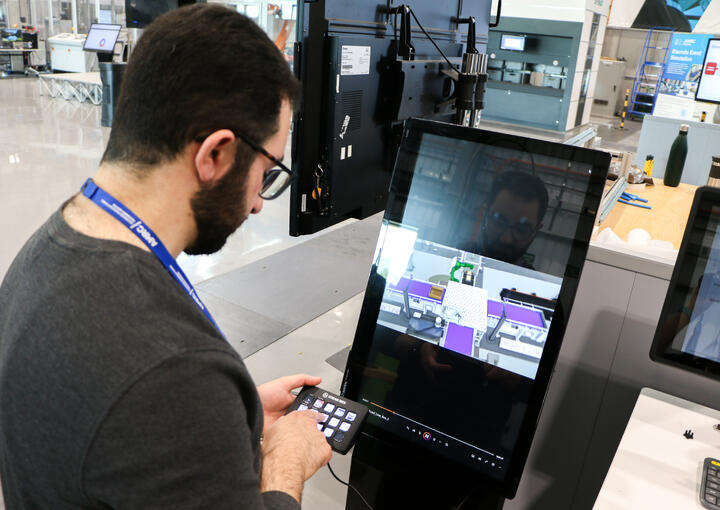Paperless shop floor becomes an AMRC first
11 October 2023AMRC Cymru is set to become the first facility in the University of Sheffield AMRC cluster to have a completely paperless shop floor.
The innovative idea, which uses computer software and an interlinked touch screen kiosk to house all the necessary documents for a shop floor to function safely, was devised by AMRC Cymru’s senior manufacturing research engineer, Anmar Al-Qutayri.
Anmar’s avid interest in gaming and computers inspired him to devise the concept and he hopes to roll out the software to all AMRC shop floors – cementing the opportunity for the organisation to strengthen its long-term sustainability footprint.
He highlights that the system is very easy to use and said one of the best things about it is you can store as many documents as needed, all in one place, and can be updated quickly without the need to use countless sheets of paper.
“Sustainability is big on the agenda for the AMRC’s future and AMRC Cymru has a key role to play it that vision,” said Anmar. “Our workshop manager, Matt Booth, was searching for ideas on how we could make the workshop more sustainable and going paperless seemed like a good place to start that would not only benefit the AMRC, but also all the companies we support so I started to look at how we could actually do it.
“The stream deck, an interactive touch pad with tailored buttons that can be programmed to display images and documents, is an integral part of the system and was something I was using at home when gaming – this sparked my idea to use the software to enable our shop floor to go paperless. I pitched the idea to Matt and he was on board, so we decided to run with it.
“Buttons on the stream deck can be customised and take you to any videos or documents you use most frequently. It may be a small touch pad, but it’s simple and works very effectively.”
Anmar highlighted that the impact of having this system in place helps to save paper, time, energy and money associated with having to manually create and use documents. It can also help to familiarise staff with machinery they’re not used to, can add a further element of interactivity to the shopfloor and enable engineers to keep up to date with safety documents and amend them at the touch of a button.
Andy Silcox, research director for AMRC Cymru, said the interactive systems gives engineers easier access to vital work documents, assessment check sheets and work instructions, rather than having to find the relevant documents in a paper format next to the machine.
He added: “As we develop the system at AMRC Cymru, the management team will have a greater assurance that the up-to-date information has been seen and understood by all users of the shop floor equipment.”
Matt Booth, workshop manager at AMRC Cymru, said feedback on the system so far from staff and other companies visiting the site has been very positive.
He added: “Since introducing this system into our workshop, we have been able to not only demonstrate the benefits to the AMRC team, but have also demonstrated it to numerous visiting SMEs and large companies. They provided great feedback relating to its sleek look, how easy it was to use and the versatility of this system - more importantly they commented on how they could all see how this system could benefit their organisation.”
Matt and Anmar began the task to set up the stream deck software system to work alongside a computer and touch screen, to be housed on a metal frame within close proximity of any machine on the shop floor at AMRC Cymru, based in Broughton, North Wale in February. Fast forward six months and four separate set-ups have been successfully created and are ready to be implemented at the research facility, which is managed by the University of Sheffield and is a member of the High Value Manufacturing (HVM) Catapult.
The user-friendly system can store all mandatory documents needing to be displayed next to any machinery on the shop floor, including method statements, risk assessments and demo videos of the machines in action and how they can be used.
Anmar added: “Most people think of the big-ticket items, including energy consumption, solar and wind – but this project, despite being smaller, will have a great impact both in the short term and for the future. Everyone at AMRC Cymru has been really positive about this project and it has spurred me on even more to get the project operational in the fastest time possible.”
The full set up, which cost about £1,700 each, was funded from a £1.5m capital purchase grant secured through Welsh Government, which is being used to help enhance the research facility’s capabilities and use on future collaborative research projects.
“I am really passionate about the work we are doing in sustainability and I want to help leave a lasting impact in my job – not just at AMRC Cymru, but across the whole organisation,” Anmar said.
“I want to help AMRC Cymru become stronger in its sustainability footprint and work towards achieving more in this space. I also want this system to become a useful tool to help new engineers coming into the business to get to grips with the machinery, how they are used and the correct safety procedures to use without them worrying or feeling intimidated.”
Anmar hopes that in the future the system could be used across other departments that rely heavily on paper documentation and have the need to keep it updated.

